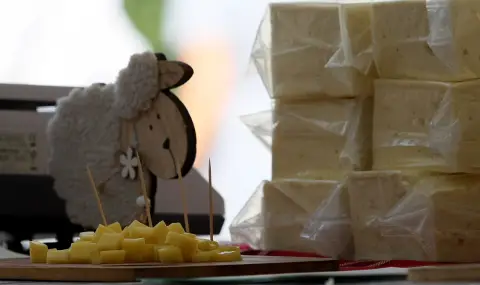A nice Gouda cheese in the Netherlands costs 8-9 euros per kilo in the supermarket. A kilogram of good Bulgarian cheese can cost 12-15 euros in Bulgaria. There are many reasons and the fault is not in the one who puts the price on the product at the end of the chain. So instead of not going shopping, go vote when it's time! Life in corrupt countries is always more expensive.
This is what Hristo Panchev recalls on "Facebook".
But it's not just corruption, here's something else:
SEARCH. The road from Rome by truck to Amsterdam is about the same as to Sofia. However, Italian cheeses are much cheaper in the Netherlands than in Bulgaria. It's not the distance. In terms of imports, our market is simply small. We are 6 million, and the Dutch - three times more. Naturally, the competition in a large market is greater, and exporters can afford to offer lower prices by fixing their margin with large quantities.
CONNECTIVITY. The Benelux countries are not large, but their common market is. If it makes a good product, a smelly cheese factory in Belgium will be able to increase capacity and reduce costs in a short time - because it is not limited only to the market within its own borders. It will win, and the customer will win too. That's what Schengen was for! What's more. That's why it is in our interest for Macedonia, Serbia, and all the others in the Balkans to join the EU at some point. Because our market will increase, and with that the price for the end consumer will fall. Better connectivity ensures that the customer does not just get “what they pour on us“, but what has become established as better and more profitable.
PRODUCTION. Have you ever been to a Bulgarian dairy farm? I have more than once. The sector had years to modernize, develop real cooperation and begin to achieve quantities and quality with which to compete with production in the West. Individual players got somewhere, grew, and even closed the circle with their own stores. Overall, however, mass, automated and hyper-efficient production, which would drastically reduce the cost price, and from there the prices, is almost non-existent.
COMPETITION. There can be no competition in a country where a businessman bribes a prime minister with a truckload of sausages. But the GERB's timelessness is not to blame for everything. “Easy” businesses at the dawn of the 90s were taken over by thugs and successors of the State Security. “Easy“ because we are talking about food, cigarettes, alcohol, confectionery, and even toilet paper.. They are too stupid for IT and there some class managed to form organically. But try starting a large import of sugar or coffee, for example, from one day to the next? Almost every large business of this type hides a story like the one about the first million. And the lack of competition and the merging of business with thick political interests is the surcharge that each of us pays in the store.
SUBSIDIES. Billions of euros have passed through Bulgaria under the EU's Common Agricultural Policy. With them, miracles could have happened with agriculture and food processing. But for the DPS and GERB it is much more profitable to agree on a percentage with a handful of obedient subsidy-takers in Maybas than with a large uncontrollable mass of independent farmers who produce, are aware of their rights and are increasingly united and intolerant of entities that try to suck from them. That is why such a group of independent, united and demanding farmers simply does not exist in our country. The corresponding production facilities are also lacking.
This is the first thing that crosses my mind. Not that the chains are conspiring against the people.
